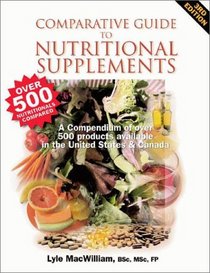Search -
Comparative Guide to Nutritional Supplements
Comparative Guide to Nutritional Supplements
Author:
This guide seeks to educate consumers about the science and value of nutritional supplementation, and to provide them with a simple, reliable tool with which to compare nutritional products. Section I: Aging, Oxidative Stress and Degenerative Disease Section I of this guide discusses the theories of aging and the intricate links between aging... more »
Author:
This guide seeks to educate consumers about the science and value of nutritional supplementation, and to provide them with a simple, reliable tool with which to compare nutritional products. Section I: Aging, Oxidative Stress and Degenerative Disease Section I of this guide discusses the theories of aging and the intricate links between aging... more »
ISBN-13: 9780973253801
ISBN-10: 0973253800
Publication Date: 5/1/2003
Pages: 128
Rating: 1
ISBN-10: 0973253800
Publication Date: 5/1/2003
Pages: 128
Rating: 1
5 stars, based on 1 rating
Publisher: Northern Dimensions Publishing
Book Type: Paperback
Members Wishing: 1
Reviews: Amazon | Write a Review
Book Type: Paperback
Members Wishing: 1
Reviews: Amazon | Write a Review
Genres:
- Health, Fitness & Dieting >> Alternative Medicine >> Vitamins
- Health, Fitness & Dieting >> Alternative Medicine >> Supplements
- Health, Fitness & Dieting >> Reference
- Health, Fitness & Dieting >> Nutrition >> Vitamins & Supplements




